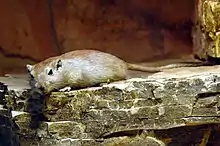Psammomys
Psammomys is a genus of rodents in the family Muridae.[1]
| Psammomys Temporal range: Late Pleistocene – Recent | |
|---|---|
 | |
| Fat sand rat (Psammomys obesus) | |
| Scientific classification | |
| Domain: | Eukaryota |
| Kingdom: | Animalia |
| Phylum: | Chordata |
| Class: | Mammalia |
| Order: | Rodentia |
| Family: | Muridae |
| Subtribe: | Rhombomyina |
| Genus: | Psammomys Cretzschmar, 1828 |
| Type species | |
| Psammomys obesus | |
| Species | |
The etymology of the genus name derives from the two Ancient Greek words ψάμμος (psámmos), meaning "sand", and μῦς (mûs), meaning "mouse, rat".[2][3]
The complete nuclear DNA genome of one Psamomys species, P. obesus, has been sequenced in 2017.[4]
It contains the following species:
- Fat sand rat, Psammomys obesus
- Thin sand rat, Psammomys vexillaris
References
- Musser, G.G.; Carleton, M.D. (2005). "Genus Psammomys". In Wilson, D.E.; Reeder, D.M (eds.). Mammal Species of the World: A Taxonomic and Geographic Reference (3rd ed.). Johns Hopkins University Press. pp. 894–1531. ISBN 978-0-8018-8221-0. OCLC 62265494.
- Bailly, Anatole (1981-01-01). Abrégé du dictionnaire grec français. Paris: Hachette. ISBN 2010035283. OCLC 461974285.
- Bailly, Anatole. "Greek-french dictionary online". www.tabularium.be. Retrieved November 8, 2017.
- Hargreaves, Adam D.; Zhou, Long; Christensen, Josef; Marlétaz, Ferdinand; Liu, Shiping; Li, Fang; Jansen, Peter Gildsig; Spiga, Enrico; Hansen, Matilde Thye; Pedersen, Signe Vendelbo Horn; Biswas, Shameek; Serikawa, Kyle; Fox, Brian A.; Taylor, William R.; Mulley, John Frederick; Zhang, Guojie; Heller, R. Scott; Holland, Peter W. H. (2017-07-18). "Genome sequence of a diabetes-prone rodent reveals a mutation hotspot around the ParaHox gene cluster". Proceedings of the National Academy of Sciences. 114 (29): 7677–7682. doi:10.1073/pnas.1702930114. ISSN 0027-8424. PMC 5530673. PMID 28674003.
This article is issued from Wikipedia. The text is licensed under Creative Commons - Attribution - Sharealike. Additional terms may apply for the media files.